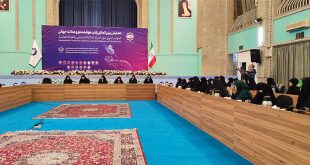The Messenger of Allah (S) is quoted on page 265, Vol. 3, of al-Amin’s work Muftahul Jannat, saying, “Allah has favored Friday over all other days, the month of Ramadan over all other months, and the Night of Destiny (Lailatul-Qadr) over all other nights.”
Is it the 17th or the 19th? Imam Abu Ja’far Muhammad ibn Ali-al-Baqir (as) is quoted in Bihar al-Anwar and Da’aim al-Islam as having said, “The 17th night of the month of Ramadan is when the two parties met, and the 19th is when the lists of the pilgrims is written down, and the 21st is when successors to the Prophets passed away and Jesus Christ (as) was raised to heaven and Moses (as) passed away, whereas the 23rd is hoped to be Lailatul-Qadr.”
Both al-’Ayyashi’s Tafsir and al-Majlisi’s Bihar al-Anwar quote ‘Amr ibn Sa’eed saying, “A man from Medina disagreed with me regarding the night (Lailatul-Qadr) when the two hosts meet, saying that it was the night of the 17th of the month of Ramadan, so I went to see Abu Abdullah (as) and told him about our disagreement, whereupon he (as) said, ‘The man from Medina did not say the truth; I know that you mean it is the 19th when the Commander of the Faithful (Imam Ali, as) was wounded, and it is the same night when Jesus son of Mary (as) was raised to heavens.”
Both references quote Humran quoting Abu Abdullah Imam Ja’far al-Sadiq (as) saying, “The destiny referred to as Lailatul-Qadr is the same destiny referred to in another verse (of Surat al-A’raf) wherein the most Exalted One says: ‘When their doom is come, they shall not remain behind in the least, nor will they go before’ (Holy Qur’an, 7:34).”
Or is it the 21st or the 23rd? Al-Husayn ibn ‘Ubaydullah, according to Majalis al-Shaykh, as quoted on p. 2, Vol. 94, of Bihar al-Anwar, quotes Ahmed ibn Muhammad ibn Yahya who in turn quotes his father saying, “I was in the company of Abu Abdullah (as) when Abu Busayr asked him, ‘Which night is the one when one is to plead to his Lord whatever he wishes to plead?’ The Imam (as) answered him by saying, ‘Either the twenty-first or the twenty-third.’
He then asked him (as), ‘What if I have no strength to observe both of them?’ The Imam (as) said, ‘How easy it is to observe them when compared to your pleas!'” Abu Abdullah (as) is also quoted in the same volume of Bihar al-Anwar saying, “The twenty-third night of the month of Ramadan is the one when every weighty matter is decided, when trials, tribulations, deaths, and means of sustenance and other matters are determined, and so will whatever Allah decrees to take place for the entire next year; so, congratulations to anyone who remains awake during it bowing, prostrating, contemplating upon his sins, weeping on their account, for if you do all of that, God willing, you will never be disappointed.”
Then he added, “Allah will order an angel to call out during each and every day of the month of Ramadhan conveying Allah’s message to them thus: ‘Good news, O My servants! I have forgiven your past sins and permitted some of you to intercede on behalf of the rest on Lailatul-Qadr except those who break their fast with an intoxicant or those who bear grudge against another Muslim brother!'” It is narrated that Allah Subhanahu wa Ta’ala wards off evil and sins and all types of trials on the 25th night from all His servants who fast and grants them light in their hearing and vision; Paradise is decorated during Lailatul-Qadr’s day and night.
The great Sunni scholar Ibn Abul-Hadid, in his commentary on Nahjul Balagha, cites Ibn Durayd’s Amali stating that al-Jarmoothi quotes Ibn al-Muhallabi quoting Ibn al-Kalbi quoting Shaddad ibn Ibrahim quoting ‘Ubaydullah ibn al-Hassan al-Fahri quoting Ibn ‘Aradah saying, “The Commander of the Faithful (as) was once asked about Lailatul-Qadr, and he said, ‘It is not at all improbable that I know which night it is and deliberately hide such knowledge, and I do not at all doubt that Allah hid such knowledge from you only out of His love for you, for if you knew which night it is, you would have honored it and left the others, and I hope you will not err in its regard.”
The selection taken from “Spiritual Journey of the Mystics (Suluk al-Arifan)” by Mirza Jawad Maliki Tabrizi.
 Ijtihad Network Being Wise and Faithful Muslim in the Contemporary World
Ijtihad Network Being Wise and Faithful Muslim in the Contemporary World
